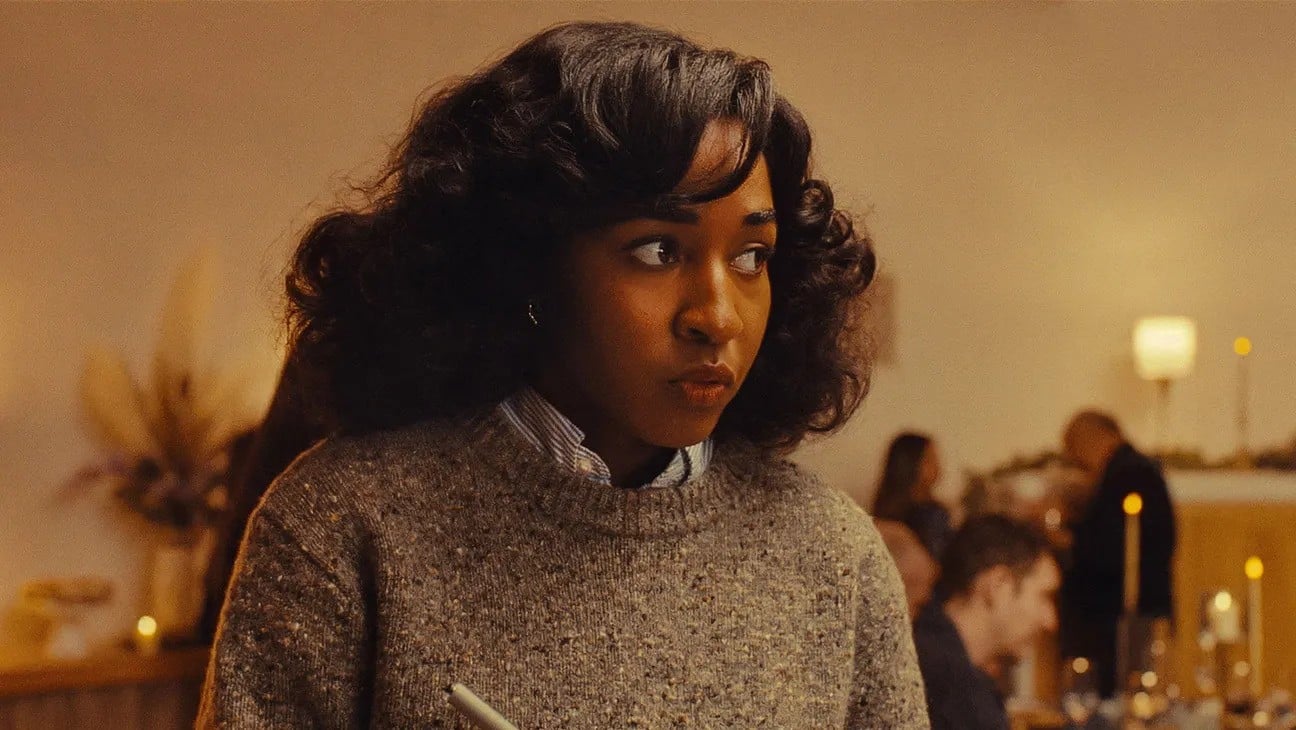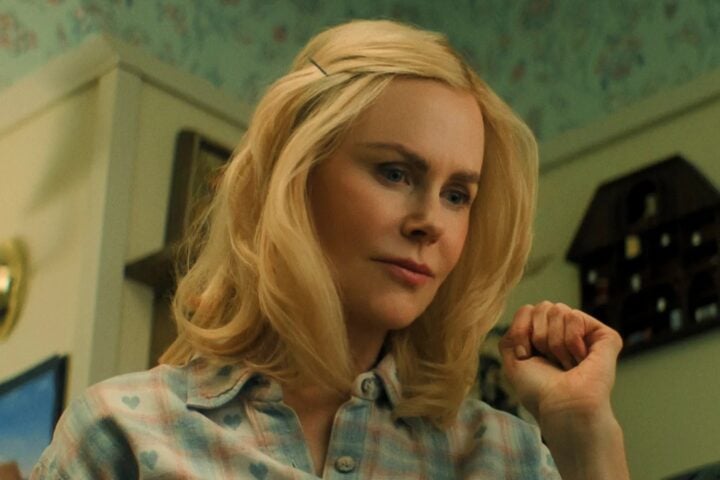Toward the beginning of Mark Anthony Green’s Opus, exasperated culture journalist Ariel (Ayo Edebiri) lays out her desired career trajectory: write about famous people “because they’re inherently interesting,” then write a book, and then write more books. Ariel’s belief that famous people are inherently interesting feels like the bad seed that keeps Opus from ever flowering. Green contrives as elaborate a mythology as he can muster for the fake famous person at the center of the film, recording artist Moretti (John Malkovich), but the writer-director’s impulse to throw everything at the wall betrays that Opus can’t focus on what makes celebrity, as well as the culture that participates in and perpetuates it, so compelling.
The staff at the glossy magazine where Ariel works loves her pitches, but her self-important boss, Stan (Murray Bartlett), keeps giving the assignments to other (male) writers. Stan gets an invite for a special weekend to listen to Moretti’s new and highly anticipated album Caesar’s Request but so does, to the surprise of the rest of the magazine’s staff, Ariel.
Opus initially displays Green’s keen ability to replicate the contemporary landscape of PR spin, with gift baskets, cryptic YouTube videos, and letterpress invites kicking off the fervor of Moretti’s return to the spotlight. Stan and Ariel are lured to middle-of-nowhere Utah, on a bus with a select few other members of the media, including a paparazzo (Melissa Chambers), an influencer (Stephanie Suganami), a podcaster (Mark Sivertsen), and a TV personality (Juliette Lewis). And when they arrive at Moretti’s compound, which is populated by followers of the Meditation for Levelers—a book included in the swag baskets received by the invitees—their devices are taken and they’re paired with concierges who survey their every move.
From there, though, the film—think Agatha Christie’s And Then There Were None for the TikTok generation—displays an inability to balance building out the world at the compound with character development. For one, it’s fairly distracted by the glitziness and strangeness of this exclusive event at the expense of lingering over most of its characters.
A feast is immediately preceded by everyone taking a chomp out of a round loaf of bread, and when the food is served, one of the also-bald members of Moretti’s crowd who’s seated next to Ariel gushes about having abandoned his job as a teacher years earlier to join the singer and teach children on the compound music theory. This exchange between a Moretti sycophant and Ariel, who’s relegated to taking notes on the trip while Stan gobbles up the opportunity to write the big piece for himself, is the extent of that character’s presence in the film.

We get a throwaway line here and there describing the professions of all the media elites in the film, but we learn almost nothing else about them. We do, though, immediately understand them to be dead meat. Which makes the gradual disappearances feel uninteresting, since there isn’t much of an audience attachment to these characters. And Opus never really clarifies why these people who die do so in the first place. Not even a crackpot explanation is offered.
Instead, Green obsesses over the weird markers of this place without necessarily considering exactly what their relationship is to the story. People have scars on their hands because they’re shucking oysters to find pearls? Sure. Bizarre paintings on the grounds of the courtyard that supposedly show the potential for, according to Moretti, “anyone to be a God” and articulate the divinity of creativity? Okay. A puppet show version of a press conference with Billie Holiday, with the journalists portrayed as rats probing Lady Day about her trauma? Uh huh.
What Opus offers as proof of fame’s cult-like shackles are external: things that have emerged out of Moretti’s fame. But the film struggles to justify or articulate how these things have come into existence. That’s difficult to do for a made-up famous person, since you have to create a character that can at least emulate the same allure of a real personality while also cultivating that fictional person’s origin or mythology. But the nuggets we get are insufficient and, save for a perfunctory montage of a slew of people singing one of Moretti’s old hits, “Dina Simone,” generally amount to a character just talking about how brilliant the superstar is.
Ultimately, Green’s film seems disinterested in the way that our relationship to celebrity shapes how we interact with the world, others, or ourselves. For however wide the spectrum of media people in Opus might be, it has little to say about how those modes are different or similar to one another in maintaining the culture of fame. And it never once bothers to acknowledge that, however toxic fandom culture or stan culture might be, those spaces to celebrate the star do offer connection to other people, imagined and real.
It’s certainly not helpful that Malkovich appears pretty checked out during the film. If Moretti is supposed to be some amalgamation of Elton John, David Bowie, Prince, and other innovators of ’70s and ’80s pop stardom, Malkovich (who definitely does have a peculiar mystique about him usually) seems unable to cast much of a spell as anyone who would warrant a legion of lackeys, much less those who’d live on campus with him. The couple of songs in the film, produced by Nile Rodgers and The-Dream, have a dizzy and dazed thwomp about them. But Malkovich’s voice is so digitally augmented and the production is so synth heavy that you don’t get a sense of the lyrics and artistry that are supposed to be so appealing about the character.
If the emptiness of celebrity is another point that Opus wants to make, thus justifying the vapidity of Moretti’s art in the film and his cult of worship, it would be more digestible if Opus actually had more conviction about conveying that belief, and about contradicting Ariel’s earlier suggestion about famous people being “inherently interesting.” Green—who spent years at GQ writing profiles of famous people like Chance the Rapper, The Weekend, and Janelle Monáe—takes dozens of different anecdotes about cults and celebrities and manages to render them pedestrian, unoriginal, staid. As Ziggy Stardust once sang, “Fame, bully for you, chilly for me.”
Since 2001, we've brought you uncompromising, candid takes on the world of film, music, television, video games, theater, and more. Independently owned and operated publications like Slant have been hit hard in recent years, but we’re committed to keeping our content free and accessible—meaning no paywalls or fees.
If you like what we do, please consider subscribing to our Patreon or making a donation.






